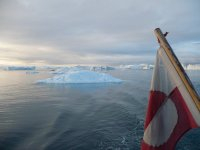
Practical information
Damien Degeorges, a Junior Researcher at the French Institute of Strategic Research (IRSEM) and PhD candidate in Political Science, provided a wealth ofinformation concerning the geopolitical, energy, environmental and security position of Greenland in the Arctic.
- According to Degeorges, Greenland is a "laboratory" of the challenges at stake in the Arctic, especially in terms of climate change, natural resources, and geopolitics.
- Being a ‘hyper-market" of energy and a keyeconomic investment for China, Greenland advances to be the nucleus of global energy security with its vast supply of rare earth elements.
- Greenland today faces three challenges according Degeorges: economic autonomy in the long term; its capacity to educate its population to tackle Greenlandish issues properly; and its capacity to open its mind to international affairs, i.e. understand what role it can play and how other actors behave with it.
This debate was part of the "Ifri's Tuesdays in Brussels".
You can find the main quotes on Twitter: @IfriBxl. You can find above Degeorges' presentation.
Other events

From Ambition to Action: Exploring Technological Partnerships with India
The 16th EU-India Summit, held on January 27th in New Delhi with European leaders António Costa, Ursula von der Leyen, and Prime Minister Narendra Modi, marks a significant milestone in deepening EU-India relations. At the same time, official bilateral visits from EU member states are on the rise, including that of the French President, who visited India in February to participate in the Artificial Intelligence Summit. As India asserts its technological ambitions and seeks to reduce its dependence on China, Europe is stepping up its efforts to diversify its strategic partnerships.

The Enlargement of the European Union: A Strategic Choice? France, the Western Balkans and the EU in an Uncertain Geopolitical Context
Russia’s war against Ukraine has brought the enlargement of the European Union back to the centre of European strategic debates. In this context, the Western Balkans have regained heightened visibility in discussions on the continent’s security, at a time when the international environment is marked by a growing number of destabilising factors.






